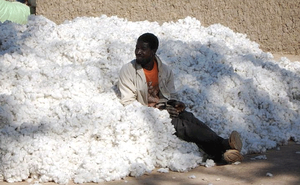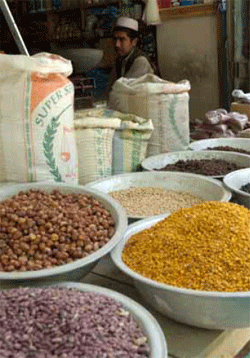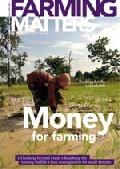Finance is a key for maintaining committed trading relationships. Value Chain Finance helps farmers’ organisations bridge the “payment gap” between harvest and export.

Recent and expected future growth rates for both the organic and fair trade markets reflect a growing consumer awareness of global trade issues and a wish to consume sustainably, along ethical and environmental lines. In both Europe and the United States, market demand exceeds supply for many products, such as sugar, coffee and cocoa, and there is growing demand for imports of these products from Latin America, Asia and Africa. However, not all suppliers/farmers in these regions are able to fully grasp these market opportunities, in particular due to lack of access to (trade) finance.
Long-term partnerships
To tackle these challenges farmers need the support of committed buyers. Buyers in the organic and fair trade markets are, generally, committed to enter into a long-term and sustainable trading partnership with local companies.
The single most important precondition for building this partnership is timely payment to the farmers, upon delivery of their produce. This means that farmers don’t experience (often lengthy) delays in receiving payments. While Fair Trade and/or organic systems generally pay higher prices, farmers’ co-operatives generally lack the cash needed to bridge the period between sourcing the harvest and receiving payment from their buyers, and cannot immediately pay farmers from their own resources. This is where the need for pre-finance arises, which is a key instrument for building sustainable trading partnerships.

In most developing countries, agricultural lending is perceived as high risk and the banking system tends to avoid it. Where agricultural lending does exist, banks often require excessive hard collateral such as land and buildings. Farmer co-operatives generally do not have enough assets to raise the finance they need, especially during the cash-intensive harvest season. Value Chain Finance differs from traditional agricultural lending: instead of relying on hard collateral, it relies on strong and committed value chains. Sales contracts with solid and reputed buyers are actually more valuable than the expected sale value of a building. When the sales revenues from such contracts are flowing into accounts held by the bank financing the co-operative, this adds another level of security. Over the past ten years, this type of lending has been successfully pioneered by a few national and international financial institutions. Triodos Bank, together with Root Capita and Shared Interest, has been among the leading pioneers in this field. The evidence shows that Value Chain Financing can be done at an acceptable level of risk. The average annual loss rate on Triodos’ trade finance portfolio over the last five years was less than one percent. The few other players in this field have similar experiences.
Trade finance: How it works
To illustrate how trade finance works, let’s go to the Meatu district in the northwest of Tanzania, the country’s main cotton-growing region. In this district 2,000 cotton growers cultivate 11,000 hectares of certified organic cotton, producing around 8,000 tons of seed cotton a year for BioRe Tanzania, Africa’s leading exporter of organically certified cotton lint. This chain is co-ordinated by Remei AG, a Swiss firm that produces and markets organically grown textiles. The garments are sold in supermarkets and fashion outlets in Switzerland and other European countries. The cotton farmers have very little capital. Cotton is their only cash crop, so they urgently need money when it is harvested. If BioRe doesn’t pay in cash, the farmers might sell their crop to other buyers – even if at a lower price. In 2008, BioRe Tanzania needed US$ 3.5 million in cash to pay its contract farmers.
BioRe Tanzania requested loans from several Tanzanian banks, but they required mounds of documents, safeguards such as the firm’s office and training centre as collateral, and personal guarantees from the managers of BioRe Tanzania and Remei AG.
Many banks see that exporting cotton is a risky business, with several factors affecting an exporter’s capacity to repay a bank loan, including climate (risk of drought), price fluctuations on the world market, and also currency risks (BioRe Tanzania buys seed cotton in Tanzanian shillings and sells lint in US dollars). These factors mean that many banks are reluctant to provide loans to cotton exporters. Swiss Remei AG made contact with Triodos Sustainable Trade Fund, one of the special purpose funds of Triodos Bank, the leading values-driven bank in Europe. This fund offers simple and straightforward trade finance loans. Triodos Sustainable Trade Fund agreed to pre-finance up to 60 percent of the contract between BioRe Tanzania and Remei AG. The start of the loan period commences with the start of the cotton harvesting season and can continue until the last shipment of cotton has left Dar-es-Salam harbour.
Triodos Sustainable Trade Fund – Who is it for?
Triodos Sustainable Trade Fund lends to agricultural exporter organisations working with smallholder farmers located in Africa, Latin America or (Central) Asia. Organisations need to be dedicated to organic production and/or Fair Trade principles. Furthermore, they need to be financially and commercially sustainable, have access to export markets for commodities or related products, and a minimum annual turnover of € 400,000.
For more information go to: www.triodos.com/sustainabletrade, or email sustainabletrade@triodos.nl.
A central element of the loan is that all payments on the contract go through a Triodos Bank account in the Netherlands, and Triodos Sustainable Trade Fund withholds part of each payment until the loan is paid off. This continues throughout the sales period, so that the loan is fully repaid by the time all the cotton has been sold. Triodos’ willingness to finance this organic cotton chain is based on the strong relationship that exists between Remei AG and BioRe Tanzania. This, in turn, is based on proven up and down stream relationships: between BioRe Tanzania, the ginnery and the farmers of Meatu district, and between Swiss Remei AG, the firms that spin the yarn and turn it into cloth, and the retailers.
The only document underpinning the loan is the sales contract between BioRe Tanzania and Remei AG, specifying the amount and price of lint to be sold. Triodos’ loan is not based on securities, but on trust that the cotton lint will be produced and sold, and that it will generate sufficient profit to repay the loan. In financial jargon, the loan is based on cash flow projections, rather than securities from assets. The repayment agreement confirms the partnership between three mutually dependent organisations, which provides the basis for successful export financing.
Promising market
The question arises: why are only a few international players prepared to take up this role as financier? What about local banks? A parallel can be drawn with the development of the microfinance sector. Triodos started financing microfinance institutions in developing countries in 1994 when it launched two specialised microfinance funds. At that time Triodos was one of the few players in the world to offer this type of investment service. The number of international investors has since increased rapidly – especially in recent years as an increasing number of microfinance institutions have become financially sustainable.
The most important development, however, has been that mainstream local banks have learned to appreciate the microfinance sector as a promising market with large business potential and acceptable risk levels. In most developing countries, the sector is now recognised as having the potential to uplift the socio-economic development of hundreds of thousands or millions of individuals. Some microfinance institutions conduct a significant part of their activities in rural areas, which means that farmers can benefit from the financial services, ranging from credit facilities and savings accounts to payment services and micro-insurance. In many countries, microfinance institutions have a special status and are supervised by the central banks. Triodos is convinced that Value Chain Finance can go through the same development phases as the microfinance sector.
A very important key factor in this is the further professionalisation of suppliers (including farmers’ co-operatives) in developing countries. Currently, not all suppliers are able to fully grasp the market opportunity due to a lack of management capacity, commercial skills and the ability to meet end buyers’ quality requirements. Very often they have no solid financial reporting system. With substantial further professionalisation at the bottom of agricultural value chains, Triodos expects that more financial institutions will start providing Value Chain Finance, especially in commodities like coffee and cotton. Their risk perception will change as they become aware that providing finance to organisations without fixed assets can still be pretty good business.
Over the last seven to eight years, Triodos has had a loan loss of less than one percent, calculated over disbursements per year. That is far less than what many would expect. We think, and hope, that this will encourage other players in the financial sector to follow suit.
Text: Koert Jansen
Koert Jansen is Fund Manager at the Triodos Sustainable Trade Fund, e-mail: koert.jansen@triodos.nl
Further reading
The case of the Meatu district is described in more detail in “Value Chain Finance: Beyond microfinance for rural entrepreneurs”, a publication from the Royal Tropical Institute (www.kit.nl) and the International Institute of Rural Reconstruction (www.iirr.org).

